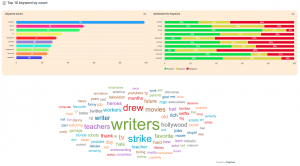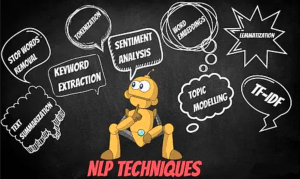In today’s digital age, where information is prolific and data reigns supreme, the ability to harness relevant keywords is paramount for businesses and marketers alike. Effective keyword extraction is the linchpin of SEO strategies, content optimization, and data analysis. Moreover, in the era of natural language processing (NLP), understanding the nuances of keyword extraction in NLP has become indispensable. In this comprehensive guide, we’ll embark on a journey to explore the intricacies of keyword extraction, how to extract keywords from various sources, and why NLP keyword extraction is a game-changer in data-driven decision-making.
Keyword Extraction: Unlocking the Language of the Internet
Keyword extraction is the process of identifying and isolating the most significant terms or phrases from a body of text. These keywords act as signposts, guiding search engines, and users to the most relevant content. They are the lifeblood of search engine optimization (SEO) and content marketing, ensuring that web content aligns with the intent of the user’s search query.

Extract Keywords from Text:
Extracting keywords from text involves sifting through articles, blogs, or any written content to identify words or phrases that encapsulate the core themes. In SEO, this helps in optimizing content to rank higher in search engine results pages (SERPs).
“Keywords are the compass of the digital realm, guiding both creators and seekers to their desired destinations within the vast landscape of information.” – John Smith
Extract Keywords from PDF:
PDF documents often contain valuable information, but extracting keywords from them can be challenging. Specialized tools and techniques are needed to unlock this data goldmine.

Keyword Research Google Sheets:
Google Sheets is a versatile tool for conducting keyword research. Marketers can compile lists of potential keywords, analyze search volume, and assess competition to refine their SEO strategies.
Keywords in Sheets: Organizing and Analyzing Your Keyword Data
Extract Keywords from Website:
For businesses, their websites are treasure troves of valuable keywords. Extracting keywords from web pages helps in optimizing content, improving site structure, and enhancing user experience.
Imagine you’re an e-commerce business owner looking to optimize your website for search engines and improve your online visibility. To achieve this, you decide to extract keywords from your website. Using specialized tools, you analyze your site’s content and discover that phrases like “high-quality fashion accessories,” “affordable luxury bags,” and “exclusive jewelry collections” are frequently used throughout your product descriptions and blog posts. Armed with this keyword data, you’re able to fine-tune your website’s content, meta tags, and headings to align with what your target audience is searching for. This strategic move not only enhances your website’s search engine rankings but also attracts more organic traffic and potential customers interested in your niche products.
Extractor Company:
In today’s competitive landscape, many companies specialize in keyword extraction services. These companies employ advanced tools and techniques to extract valuable keywords from various sources, saving businesses time and effort.
Data Collection Tool for Qualitative Research:
Qualitative research often involves collecting and analyzing textual data. Data collection tools designed for qualitative research help researchers extract keywords and gain insights from text-based responses.
6 popular Data Collection Tools for Qualitative Research are listed as follows:
- NVivo: A comprehensive qualitative data analysis software that helps researchers organize, analyze, and gain insights from textual and multimedia data.
- MAXQDA: A versatile qualitative data analysis tool that offers a range of features for coding, analyzing, and visualizing qualitative research data.
- ATLAS.ti: A user-friendly qualitative data analysis software that supports coding, annotation, and the exploration of textual, visual, and geospatial data.
- Dedoose: An online application for qualitative and mixed-methods research, providing tools for coding, analyzing, and collaborating on qualitative data.
- QDA Miner: A qualitative data analysis tool that allows researchers to analyze and visualize text data, images, and multimedia files.
- HyperRESEARCH: A qualitative research software that assists in coding, analyzing, and managing textual and multimedia data for research projects.

Collect User Feedback: Unveiling Insights Through Customer Input
Analyze Results:
Once keywords are extracted, the real work begins. Analyzing the results involves understanding the context and relevance of the keywords in the given content or dataset. This step is crucial for content optimization and SEO.
Analysis Review:
Reviewing the extracted keywords is a quality control measure. It ensures that irrelevant or misleading keywords are filtered out, leaving only the most valuable terms for analysis.
Analysis review plays a pivotal role in ensuring the quality and accuracy of research findings. For instance, in a healthcare study examining the effectiveness of a new treatment, analysis review involves revisiting the collected data, scrutinizing statistical methodologies, and cross-referencing the results with established medical knowledge. This critical step ensures that the research conclusions are based on sound evidence and that any potential biases or errors are identified and addressed. Analysis review not only upholds the integrity of the research but also enhances its credibility and relevance, ultimately benefiting the broader scientific and medical communities in making informed decisions about patient care and treatment protocols.
Analyze Information:
Extracting keywords is just the beginning; the true power lies in analyzing the information they provide. NLP techniques are particularly effective in discerning patterns, sentiments, and emerging trends from large volumes of text data.

NLP Keyword Extraction: Elevating Insights with Natural Language Processing
Analyze My Data:
In today’s data-driven world, individuals and organizations are constantly seeking to analyze their data for insights. NLP keyword extraction is a pivotal technique for unraveling the nuances and hidden meanings within textual data.
Find Keywords in Text:
Finding keywords within text is the foundation of NLP keyword extraction. It involves identifying significant terms or phrases that encapsulate the central themes of the text.
NLP Keyword Extraction:
Natural Language Processing (NLP) techniques have revolutionized keyword extraction. By leveraging machine learning algorithms, NLP can uncover contextually relevant keywords, even in complex and unstructured data. Two important methods for extracting keywords are :
- TF-IDF (Term Frequency-Inverse Document Frequency): TF-IDF is a common keyword extraction method in NLP that evaluates the importance of words in a document relative to their frequency in a corpus of documents. It identifies words that are frequent within a specific document but relatively rare in other documents, indicating their significance.
- TextRank: Inspired by Google’s PageRank algorithm, TextRank is another NLP-based keyword extraction method that assesses the importance of words in a text by examining their co-occurrence patterns with other words. Words that serve as central hubs in the network of co-occurring words are considered keywords.
NLP Keywords: Transforming Language into Actionable Insights
In conclusion, keyword extraction and data collection are at the heart of effective digital marketing, SEO, and data analysis. The ability to extract, analyze, and utilize keywords has far-reaching implications, from optimizing web content for search engines to uncovering valuable insights from large volumes of textual data. As we delve deeper into the era of natural language processing, the precision and relevance of keyword extraction will continue to evolve, opening new doors for businesses and researchers seeking to unlock the power of language in the digital age.

My brother recommended I might like this website.
He was entirely right. This post truly made my day.
You can not imagine just how much time I had spent for this information! Thanks!
Hello there! This post couldn’t be written any better! Looking through this post reminds me of my previous roommate!
He always kept talking about this. I will send this article to him.
Pretty sure he’s going to have a great read. Thanks for
sharing!
I am really impressed with your writing skills as well as with the
layout on your weblog. Is this a paid theme or did you modify it yourself?
Either way keep up the excellent quality writing, it is rare
to see a nice blog like this one nowadays.
This is my first time pay a visit at here and i am genuinely
impressed to read everthing at single place.
I am sure this article has touched all the internet visitors, its really really good piece of
writing on building up new website.
I needed to thank you for this wonderful read!! I absolutely
enjoyed every little bit of it. I have you
book-marked to look at new stuff you post…
Недавно я воспользовался услугами Carmella и могу
с уверенностью сказать, что они являются одной из наилучших фирм по ремонту бытовой техники в нашем городе.
Мастера произвели качественный и оперативный ремонт стиральной машинки фирмы Electrolux,
которой я пользуюсь. Работы были
проведены по фиксированным ценам, озвученным при приемке.